Some Notes From The Lockdown Relief Campaign in India
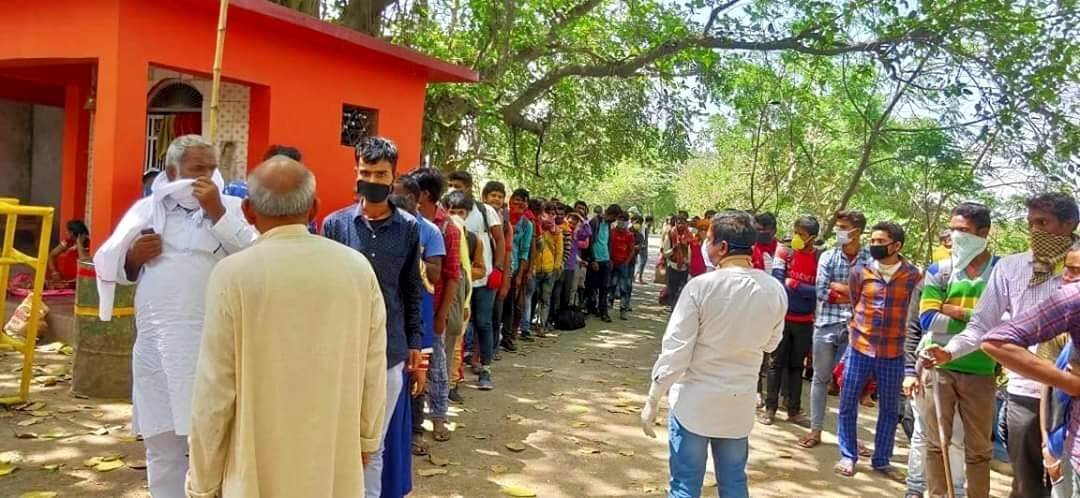
EVERY morning of the lockdown, CPIML and AICCTU comrades sitting in their homes or offices across India have a quick cup of tea, and then prepare for the avalanche of distress calls from migrant workers stranded without food, water, or shelter in cities and towns across India. These calls continue up to 1 am at night.
One of the lightning rods for the calls is Comrade Vinod Singh, the young CPIML MLA from Bagodar (Jharkhand), who has earned a reputation over the years for helping Jharkhandi workers who face troubles overseas or in other states. Comrade Vinod’s own constituency Bagodar, his own home village of Khambra, and his district of Giridih alone, along with neighbouring districts of Kodarma and Barkattha, account for a very large contingent of migrant workers in the rest of India and overseas. By word of mouth, the workers’ grapevine has spread the word that Comrade Vinod can, maybe, send help when other political and government offices present a blank bureaucratic wall of indifference. Comrade Vinod is known for answering his own calls on his mobile phone, and personally monitoring rescues and relief. But this time, with the Modi’s Government’s dramatic and sudden announcement of a 21-day lockdown, Comrade Vinod was drowning in calls for help. Exhausted, he struggled to keep afloat as comrades divided the work of receiving and responding to the calls. He would need to divert calls to comrades’ numbers, so that they could all take it in turns to attend the non-stop flood of calls.
In Karnataka, in the very first couple of days of the lockdown, our comrades, with the help of a vast range of small social, religious organisations and individuals could launch a remarkable public-minded effort. They mapped various sections of workers and identified ways in which these sections faced difficulties on account of the sudden lockdown. They could arrange relief for 90 separate groups of workers (groups as small as 5 and as big as 500) in Bangalore alone. They could also reach out to workers stranded in many other Karnataka districts. As Comrade Clifton D’Rozario, CPIML Karnataka Secretary, said, “We are a small force and there is no way we could have done any of this alone. This has been a remarkable experience of how people can pool their energies to become much stronger than their individual strengths.” Apart from migrant workers, they could help sanitation workers, sex workers, transgender persons, and could also make sure that employers and the government were held accountable and not allowed to leave workers in the lurch. AICCTU prepared a database of workers stranded in Mangalore, Udupi, Bangalore, Hassan and other districts of Karnataka and shared the database with the Labour Department.
In Tamil Nadu, AICCTU and CPIML comrades took the help of civil society organisations and activists to help connect migrant workers with community kitchens run by the municipality, as well as provide rations and shelter to workers in need. In Kerala also CPIML comrades worked with a range of other groups and activists to help migrant workers in distress, connect them with government help, and offer them hospitality and care.
One of the most remarkable things to witness was how people worked together to overcome the difficulties of language. There were workers from West Bengal, Odisha, Bihar and Jharkhand stranded in Tamil Nadu, Andhra Pradesh, Telangana, Karnataka, Kerala. Likewise there were workers from Tamil Nadu stranded in Maharashtra or Gujarat, who received help and hospitality.
In Telangana, and Hyderabad in particular, former JNUSU President Sai Balaji and former RYA President Om Prasad responded to innumerable calls for help and could arrange for relief with the help of the Telangana administration and police.
In Maharashtra, Comrades Uday Bhat, Jeevan Surude, and Atul Dighe of Lal Nishan Party helped arrange relief and rations for workers stranded in various rural districts. A very large number of migrant workers are stranded in Mumbai, Navi Mumbai, and Thane. CPIML Comrades Ajit Patil and Sadrul Ansari, and Shyam Gohil, and Dhiraj Rathore, have heroically dealt with thousands of calls for help. Comrades in Delhi and Jharkhand helped them tackle these calls and arrange help, as have Lal Nishan Party comrades. But the sheer volume of calls is so high that the task is very difficult. Gradually, comrades have built up a database of names and numbers and have been trying to bring those in need of rations and other necessities to the notice of the concerned government authorities.
In Rajasthan too, CPIML, AIPWA, AISA, and AICCTU comrades have done a remarkable job of working with other organisations to provide relief to workers and protect persons from discrimination. Detailed reports from Jaipur and Udaipur are below.
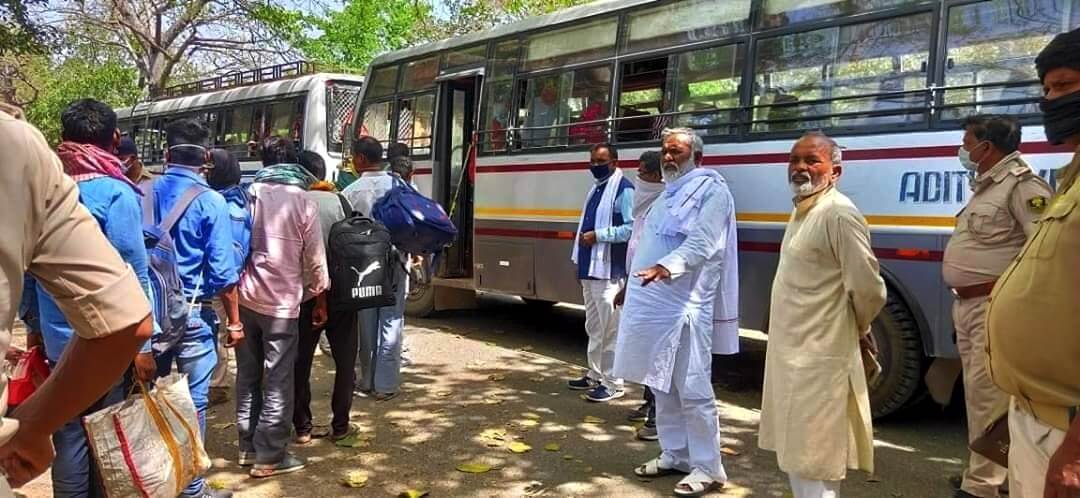
In Bihar and Jharkhand, CPIML MLAs have written to the Chief Ministers of various states, demanding that the home states as well as the host states take responsibility for caring for migrants hit by the unplanned, sudden and therefore more devastating lockdown. The MLAs also demanded arrangements for food rations, quarantine, and proper medical facilities to cope with the Pandemic. These are all sorely lacking in rural Bihar and Jharkhand. But CPIML MLAs personally intervened to correct the inhuman nature of some of the so-called “quarantine” facilities, as well as to ensure delivery of rations to vulnerable communities and help migrant workers from UP return home from Bihar.
For the persons on the frontlines, (wo)manning the phone lines and addressing calls for help, the situation can get quite stressful. As one comrade put it, “When an attempt to arrange food falls through, and just as you yourself sit down to your dinner, you get a call from a family in Mumbai that has been hungry all day and still has not got food, how can you eat?” In one case, a large number of workers from Giridih, Jharkhand stranded in Wadala, Mumbai, had with them a child who is a cancer patient. They were hungry for several days, surviving on biscuits, and then managed to eat at a community kitchen. But they wanted to be able to give the sick child home-cooked food, and not risk an infection with food from outside. Eventually, we did manage, with the help of Teesta Setalvad and the Citizens for Justice and Peace volunteers, to get them rations and vegetables, and also send them money to buy salt and oil. The photos the families sent of beaming children and full stomachs offered our comrades some relief from the pressure of their work.
Many other groups and individuals (too many to name) stepped up to help and organise rations, food and medicine in Mumbai, Navi Mumbai and Thane. We are deeply grateful to them all.
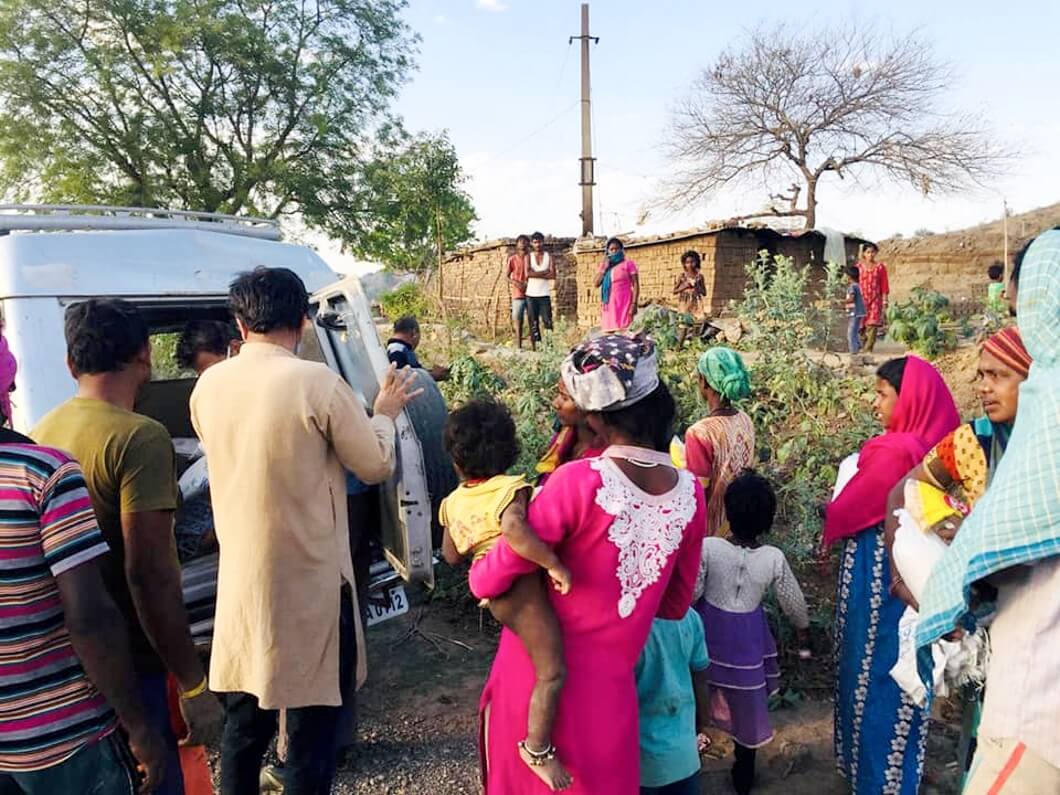
Some experiences from Rajasthan
As soon as it was known at Jaipur that the State government was going to implement a lockdown, CPIML State Secretary Mahendra Chaudhury asked the Party District office in-charge in Jaipur to convert the Jaipur State office into a relief center.
The manner in which the government took a snap decision to impose lockdown showed that they had no preparations in place for this and the people would face great distress in the time to come. Therefore the State office was converted into a Base Station and essential rations were immediately arranged with the help of people. Even now help is continuing to be given to the maximum possible extent with people’s help and contribution, morning to night from 6 AM to 1 AM.
Three vehicles are plying daily about 400 km and reaching essential provisions to the needy in every corner of the city. CPIML activists are working 24x7 to help people out on the streets suffering from hunger. Gradually, activists from other Parties and organizations have also started joining this effort, such as AISA, RYA, AIRSO, NFIW, CPM and others.
Now that the crisis is growing in Jaipur, the CPI office has also been converted into a 24x7 call center from where an effective helpline has been started that remains open all through 24x7. Till date, with people’s help and contribution, dry rations have been supplied to 1000 people and cooked food has been supplied to 9000 people through Gurudwaras and appeals to the public. 90% of the beneficiaries are migrant workers from Bihar, Bengal and Uttar Pradesh.
Arrangements for rations have also been made through daily meetings with the District administration. Even now relief through the government is only about 5%; therefore a 24x7 helpline has been started in order to coordinate between workers and the government.
During the movement of the migrant worker also, 2 vehicles were kept plying on the roads 24x7 as a helpline, and hundreds of workers were transported by bus and other means to the border.
Help is being given 24x7 to workers from Bihar, Bengal and Uttar Pradesh who are stranded in Jaipur.
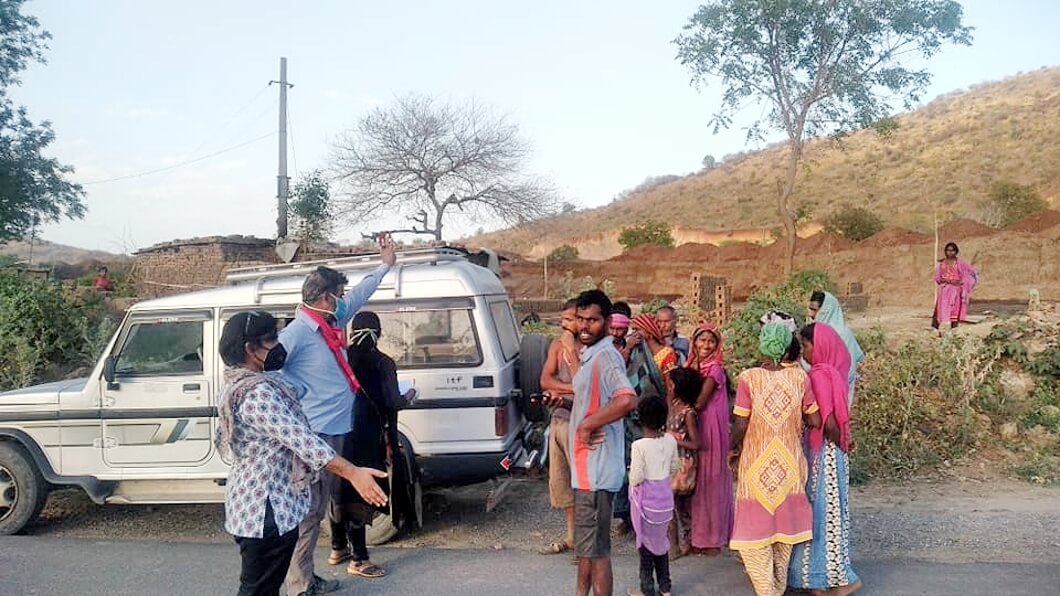
In Udaipur, a joint team of AICCTU and AIPWA has over two days visited the industrial areas of Madadi Kanpur, Umarda, Kaladvas and Lakadvas and identified needy workers for ration distribution. The team comprised Saurabh Naruka, Chandradev Ola (AICCTU), Rinku Parihar (human rights activist) and Hina Khan (AIPWA).
The more needy workers were provided with immediate rations. Most of them informed the tram that nobody had yet contacted them for ration distribution, but some of t hem did say that they had been provided with cooked food.
During the survey the team identified about 280 workers who work in brick kilns (130), marble (30), animal husbandry and industrial flour mill (56), chemical factory (25), construction (160). Most of these workers come from various Districts in Bihar, Chhattisgarh and Uttar Pradesh.
In one factory about 40-50 workers were constrained to live in a few temporary sheds. How they can possibly practice ‘social distancing’ is something to think about!
The brutal behavior of the police towards workers during this lockdown can be understood from the fact that some adivasi workers from Chhattisgarh (brick kiln workers) started running away when they saw our vehicle, thinking that it was a police-administration vehicle. After that when we spoke to them patiently and affectionately they understood that we had not come there to beat them up with lathis but to provide them with some relief. When asked why they ran away upon seeing the team vehicle, they said they thought it was the administration come to beat them up. This gives us an idea how ‘democratic’ the behavior of the administration towards workers is in a democratic country.
The workers told the team that they were arranging one week’s ration using the ‘kharcha’ (sustenance money) given by the owner/contractor, but they were afraid that when work starts again after the lockdown this money will be considered as ‘advance’ payment and will be included in the accounts.
The workers were not aware of any kind of government machinery as to the unofficial announcement that wages will not be cut during lockdown, or how this unofficial announcement will be implemented. There are no arrangements in place for compensation of income loss to daily wage workers, and they are getting mired deeper and deeper into debt through ‘advance’ payments from owners/contractors.
Identified and listed workers will be provided rations by AICCTU/AIPWA and the list will also be given to the administration to ensure provision of rations for them.
Through our resources as well as contributions, about 140 workers were provided with ration kits and 30 workers were provided with ration materials (not kits).
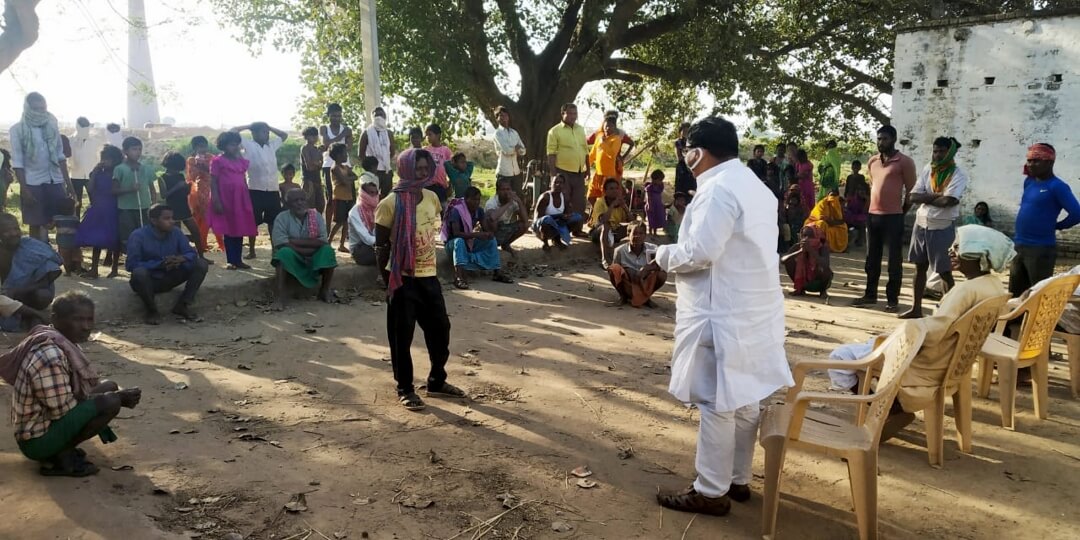
Experiences from Bihar
CPIML activists are going to villages and towns in various Blocks and explaining to workers, farmers, poor, and daily wage workers how to change basic habits and practices to prevent the spread of Coronavirus. They are alerting the people to basic precautions like physical distancing, repeated washing of hands, cleanliness and hygiene, and covering the mouth with cloth or hand while coughing or sneezing.
CPIML activists have prepared hundreds of quarantine centers in villages, Tolas, towns and cities of Bihar for treating suspected patients, also making arrangements for their food. In Siwan District under the leadership of Darauli MLA Satyadev Ram and popular Kisan leader Amarnath Yadav, arrangements are being made for the primary medical examination and transporting home of migrant daily wage workers who have walked and reached Siwan from UP-Bihar borders. Adequate arrangements are also being made for their food and stay.
Similarly in Bhojpur, AISA-RYA activists led by Tarari MLA Sudama Prasad, Manoj Manzil and Raju Yadav have made teams and are going to different villages and Tolas to distribute rations, soap, and hand-wash to workers, farmers and the poor and to help them in whatever problems they are facing.
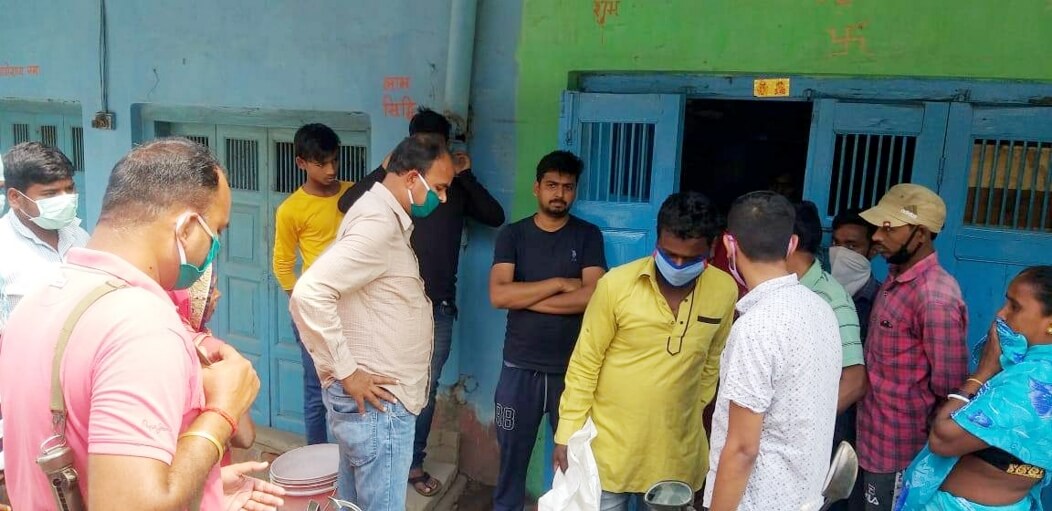
In Jharkhand, CPIML MLA Vinod Singh along with Party activists is going amongst the poor, workers, farmers and adivasi communities and helping to resolve their problems to the maximum possible extent. Comrade Vinod Singh is also putting pressure on the government to make rations available, as well as telling the government to coordinate with other State governments in helping migrant workers from Jharkhand stranded in other States.
CPIML activists have prepared a list of the hundreds of daily wage workers stranded in other States and sent it to Chief Minister NItish Kumar so that interventions are done to make arrangements for their care as well as food and stay.
CPIML has also raised its voice against the repression unleashed on migrant workers from Bihar who have returned to their home districts, in the name of quarantine; as well as against other people in the name of the lockdown.
In Jehanabad, instead of advising and explaining to the people the police are adopting repression and atrocity. 40 workers from Durgapur in West Bengal had returned to Dayali Bigaha village in Modanganj Block, Jehanabad District and they were screened. Afterwards 6 more workers arrived who could not get any Corona-related screening or testing done. As per the reports the Circle Officer came along with a police force and started abusing the 6 workers instead of explaining to and advising them. This vitiated the atmosphere in the village and a tense situation developed, after which the CO went back.
But soon a posse of police arrived led by the DM and SP, and started blindly beating up the villagers. The basti has about 150 houses and the police entered the houses, climbed up to the terraces, and beat up the people. They broke the handles of the hand pumps. The whole village was terrorised.
When they protested against this, CPIML activist Yogendra Yadav and 3 other leaders were arrested and sent to jail.
In a similar situation at Bhore Block in Gopalganj, people’s anger burst out because of the repressive behavior of the Bhore Circle Officer, Jitendra Kumar Singh who indiscriminately beat up people, many are badly injured.
On 28 March same CO brutally beat up and injured a 70-year old man who earned his livelihood by ironing clothes to make him shut his shop near Dharikshan More. Another such incident occurred at Kali More where a 75-year old man on his way back home was beaten up and left unconscious. A third incident occurred at Vishrampur where two women going for work on mustard fields were beaten up. The fourth incident involved the beating up of two persons who were cooking; the Circle Officer also confiscated their vessels and gas stove. The angry villagers jammed the Bhore-Pirganj road in protest on 30 March and raised slogans against the goondaism of the CO.
The CPIML has demanded that the administration should immediately put an end to such repressive actions and to immediately release ML leaders in Jehanabad and others arrested baselessly; strict action against DM, SP and Modanganj Circle Officer, Bhore (Gopalganj) Circle Officer is also demanded along with the immediate relief and compensation for the victims.
Charu Bhawan, U-90, Shakarpur, Delhi 110092
Phone: +91-11-42785864 | +91 9717274961 E-mail: info@cpiml.org

